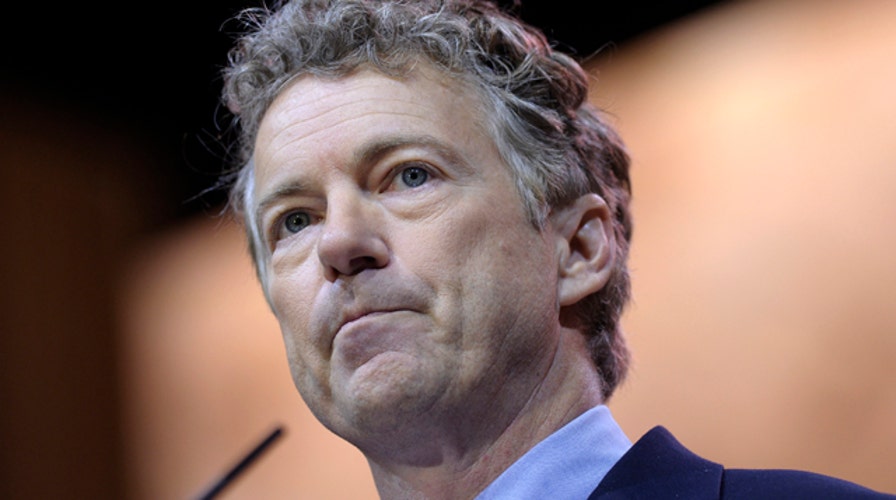Bias Bash: Is the media ignoring a Rand Paul surge?
Justin Duckham asks if news outlets are missing the facts on Kentucky senator
Mushroom or pepperoni? That’s what Republicans wonder as Rand Paul challenges his party to shake up its brand. Paul says that, like Domino’s, which changed its pizza crust to stay competitive, the GOP needs to become a “different kind of party.”
The problem is, the Republican kitchen teems with would-be chefs, each cooking up distinctly different party recipes. Will the Kentucky senator serve up the right message with his timely attacks on the NSA, or will Putin’s aggression in Crimea sour Americans on Paul’s isolationism?
[pullquote]
After Mitt Romney’s stinging defeat in 2012, GOP elders did some serious navel-gazing. They reached an epiphany: It was going to be impossible to occupy the White House ever again if Republicans continued to affront women, blacks, Hispanics and young people.
This would seem obvious. For starters, there are more women than men in the U.S. (161 million vs. 156), and a higher percent of them vote (64 percent to 60 percent). Also, some 19 percent of voters in 2012 were under the age of 30.
Next, the number of Hispanic voters has now reached 10 percent of the total, and the group is critical in swing states like Colorado, Nevada and Florida. Blacks make up 12 percent of eligible voters. Do the math; as mentioned, obvious.
None of this has eluded Democrats. They have brilliantly targeted and pursued key voting blocs, which is why an underachieving president with a wafer-thin resume came to be elected, and then reelected.
Consensus built: To win the White House, Republicans had to open the tent flaps – change the crust. But how?
Rand Paul thinks he has the answers. He is adopting his libertarian credo in ways that appeal to young people and to all who instinctively oppose Big Government (a big group, by the way).
In his recent speech at Berkeley, Paul lambasted the NSA for its intrusive spying on everyday Americans – tapping into bipartisan and widespread anger over our government’s surveillance programs.
According to the most recent Pew poll, taken in January, 53 percent of Americans disapprove of “the government’s collection of telephone and Internet data as part of anti-terrorism efforts.”That figure jumps to 59 percent for people ages 18-29.
Young people – those whose palates are not quite formed – may well turn out to be the most winnable group as we head toward 2016.
In a poll done around the turn of the year by Harvard’s Institute of Politics, almost half of young voters said they would recall President Obama if they could.
That’s an astonishing revolt against a politician who not so long ago locked up 67 percent of the under-30 vote.
Obama’s job approval with young people had tumbled to 41 percent, down 11 points from six months earlier. Young people are disillusioned with Obama’s inability to change Washington’s culture as he had promised, and incredulous over the botched rollout of ObamaCare.
A federal government that cannot, with all its resources, produce a functioning website – when boy geniuses spin tech leviathans out of their garages all the time – is not credible.
One post-election analysis concluded that if Romney had split the youth vote, he would have won the election – suggesting Paul is on the right track. But – he also needs to win over Romney’s supporters.
That means Paul must still court older white voters – establishment Republicans. For this group, Paul offers lean cuisine – broad opposition to Big Government. With the public’s trust in government hitting all-time low levels, that’s a powerful message today.
In the past year, for the first time ever, a majority of Americans (53 percent) said they thought the federal government was impinging on their “personal rights and freedoms.” That included 76 percent of self-described conservative Republicans – the base that Paul needs to attract. The continuing ill effects of ObamaCare – that all-encompassing Blob of Regulation that continues to roll over the country despite widespread and enduring opposition – will feed this fervor.
Paul’s biggest obstacle to winning the GOP slot in 2016 will likely be his cautious approach to military engagement, which some consider isolationist. When former GOP standard-bearer John McCain – a national hero – calls a fellow Republican a “wacko-bird” and says he would have a hard time deciding between Hillary Clinton and Paul, there’s a problem.
With Putin’s aggression in Crimea rousing Americans to demand a more robust response from Obama, Paul’s message of detachment may turn off voters. However, just as Paul ventured into the lion’s den by speaking at uber-liberal Berkeley, he has also confronted opponents by speaking on foreign policy at the Citadel and at the Heritage Foundation – not exactly friendly turf for pacifists.
His message at those institutions convincingly invoked GOP demi-gods Ronald Reagan and Dwight D. Eisenhower, referencing their vision of “peace through strength.” He is adamant that Congress, and not the president, should wage war, as outlined in the Constitution. He references Reagan Defense Secretary Caspar Weinberger’s summation that “war [should] occur only as a last resort, only when vital national interests are at stake and only when our objective is complete victory.”
Many who disapproved of the Vietnam War, and of our entanglements in Iraq and Afghanistan, would agree. Others who think Obama’s inability to voice a coherent foreign policy and who think his tendency to “lead from behind” has been a disaster will also find much to like in Paul’s approach.
Will Paul’s recipe win him GOP backing in 2016?
Perhaps.
Meanwhile, the good news for Paul, and for the GOP? Republicans may not suit all tastes, but voters appear to have less and less appetite for the Democrat stew known as ObamaCare.

